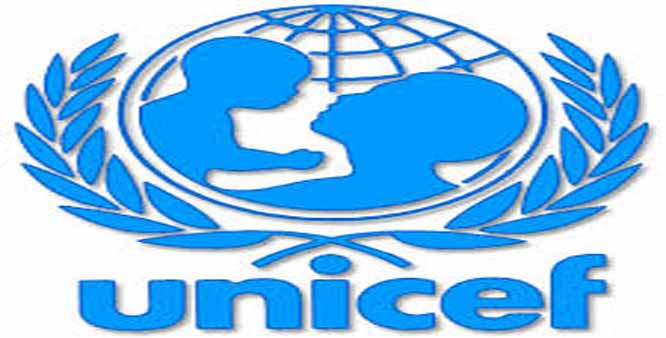UNICEF moves to increase awareness on Early Childhood Education development, as experts, stakeholders decry poor funding, list gains

By JOHN NWOKOCHA, Abuja
The United Nations Children’s Fund (UNICEF) on Wednesday took steps towards increasing awareness on the Early Childhood Education Development (ECED), program in Nigeria. UNICEF disclosed that only one out of three children in the country attends the ECE, warranting the concerns for raising awareness on the need to get more children and parents to embrace the programme. The stakeholders and experts lamented poor funding, saying it hampers attainment of the objectives of the ECE.
UNICEF also urged the federal government through the ministry of education to do the needful towards ensuring that more Nigerians are sensitized about the ECED.
The one out of three children in the country attending the ECED, according to the United Nations, represents 36 percent of children in Nigeria.
Speaking at a Media Dialogue on Early Childhood Education, jointly organised by UNICEF, Child’s Right Information Bureau and the Federal Ministry of Education, held in Sokoto, North-West, Nigeria, education expert who frowned at the low figure called on governments to be deliberate in supporting the ECE across the country. The expert, Mrs Yetunde Oluwatosin revealed that about ten million Nigerian children are not enrolled in ECE.
The data according to her was made available by the National Personnel Audit of 2018 ,carried out by the Universal Basic Education Commission, UBEC.
Oluwatosin noted that rather than engaging in remedial programmes, Nigeria should be spending more on ECE to build a solid foundational education system.
The education specialist maintained that childhood education remained a “critical period of education that must be consciously built to achieve a resilient national basic education system”.
Her words: “Science has revealed that starting education with the ECE addresses the challenge of foundational learning, it is a play based pre-primary education that remains the bedrock of child development.
“The ECE stimulates child’s domain and it is the foundation that transits children to primary education level”.
In his remarks, UNICEF Sokoto Chief Field Office, Dr Maryam Darwesh Saeed said that many children are not currently accessing pre-primary education.
The Chief Field Office stressed however, that UNICEF was committed to ensuring that all girls and boys have access to quality early childhood development, care and pre-primary education, so that they are ready for primary education (SDG 4.2, 2030).
Saeed also called on the media to ensure informed reporting to increase awareness of the key gains of Play based ECE in Nigeria.
Making her contribution, education expert, Country Representative Early Childhood Development Initiative Nigeria ECDI, Dr Amy Panyi Shalangwa , said there was need to strengthen early childhood education and strengthen existing curriculum in ECE.
Shalangwa disclosed that the ECDI carried out a research work on strengthening the capacity for play-based learning in Nigeria.
According to her, the research revealed that with ECE, there was improved quality of learners, increased schools participation, increased graduation rate as well as stronger economic and societal development.
Also speaking, UNICEF Communication Specialist, Dr. Geoffrey Njoku, identified inadequate resources and non-judicious use of available resources as major challenges facing ECE in Nigeria.
Njoku said the Dialogue aimed at advocating for more attention on ECE.
“The media dialogue was organised to advocate for more attention on ECE because we see that if Nigeria doesn’t pay attention to the early childhood education the country will face challenges in the technology space as well as in other sectors,” Njoku stressed.
It was disclosed that there are only 500 ECE centres out of 2000 primary schools in Sokoto State.
Decrying the situation, the experts and education stakeholders said the centres are inadequate. They also lamented shortage of trained caregivers and lack of adequate governments’ support. The stakeholders equally expressed worry over what they called ‘limited infrastructure/Materials for early child education’.
“Poor sector analysis planning and coordination , inadequate spending on ECE and lack of data on early learning.“ Oluwatosin stated.
Another drawback they said is that presently, only 154,000 teachers are in the system handling over seven million learners enrolled in the ECE centers.
She disclosed that UNICEF has developed play based one year pre-primary curriculum in collaboration with the Nigeria Education Research Development Council NERDC and the National Commission for Colleges of Education.
Speaking on the gains of the ECE, the experts listed among others that Nigerian children are better equipped to compete favourably with their counterparts in the world if they had ECE.
The experts are unanimous in saying that ECE has great potential if integrated into education system.
“The importance of early learning is entrenched in the second target of Sustainable Development Goal 4, which seeks to ensure that, by 2030, “all girls and boys have access quality early childhood development, care and pre-primary education so that they are ready for primary education.
Pre-primary education is now considered an essential tool for achieving Universal Primary Education and the SDGs.
“Ensuring access to quality pre-primary education is a key strategy for improving learning and education outcomes as well as the efficiency of education systems”, the experts maintained.




Hi, I think your site might be having browser compatibility issues. When I look at your website in Safari, it looks fine but when opening in Internet Explorer, it has some overlapping. I just wanted to give you a quick heads up! Other then that, fantastic blog!
telegram中文版提供中文版本的Telegram下载。不仅有pc电脑桌面版,还有苹果手机和安卓APK版本可供选择。纸飞机app是一款超10亿用户的聊天应用,其卓越的安全性和稳定性深受用户青睐。
I really appreciate this post. I have been looking everywhere for this! Thank goodness I found it on Bing. You’ve made my day! Thanks again
It?¦s actually a great and helpful piece of information. I?¦m happy that you shared this helpful information with us. Please stay us informed like this. Thanks for sharing.
Aw, this was a really nice post. In idea I want to put in writing like this moreover – taking time and precise effort to make an excellent article… but what can I say… I procrastinate alot and on no account seem to get something done.
Very interesting points you have noted, thankyou for posting.
I’ve learn some good stuff here. Certainly value bookmarking for revisiting. I wonder how much effort you set to create this kind of great informative site.
Wohh exactly what I was looking for, thanks for posting.
Great work! This is the type of information that should be shared around the internet. Shame on the search engines for not positioning this post higher! Come on over and visit my web site . Thanks =)
Thank you for some other great post. The place else may just anybody get that type of information in such a perfect means of writing? I have a presentation subsequent week, and I am on the search for such information.
You are a very smart individual!
Hi, Neat post. There’s an issue with your web site in web explorer, might check this?K IE nonetheless is the market chief and a big part of other people will miss your magnificent writing due to this problem.
I was looking through some of your posts on this website and I think this website is really informative ! Keep posting.
Lovely site! I am loving it!! Will be back later to read some more. I am bookmarking your feeds also.
I went over this internet site and I believe you have a lot of good info, saved to bookmarks (:.
Hey There. I found your blog using msn. That is a very smartly written article. I will be sure to bookmark it and come back to read more of your useful info. Thanks for the post. I’ll certainly return.
You have remarked very interesting details! ps nice site. “I hate music, especially when it’s played.” by Jimmy Durante.
Very interesting points you have mentioned, thanks for posting.
I was looking through some of your blog posts on this internet site and I believe this site is very instructive! Retain posting.
I really like your writing style, superb info, thanks for putting up :D. “In university they don’t tell you that the greater part of the law is learning to tolerate fools.” by Doris Lessing.